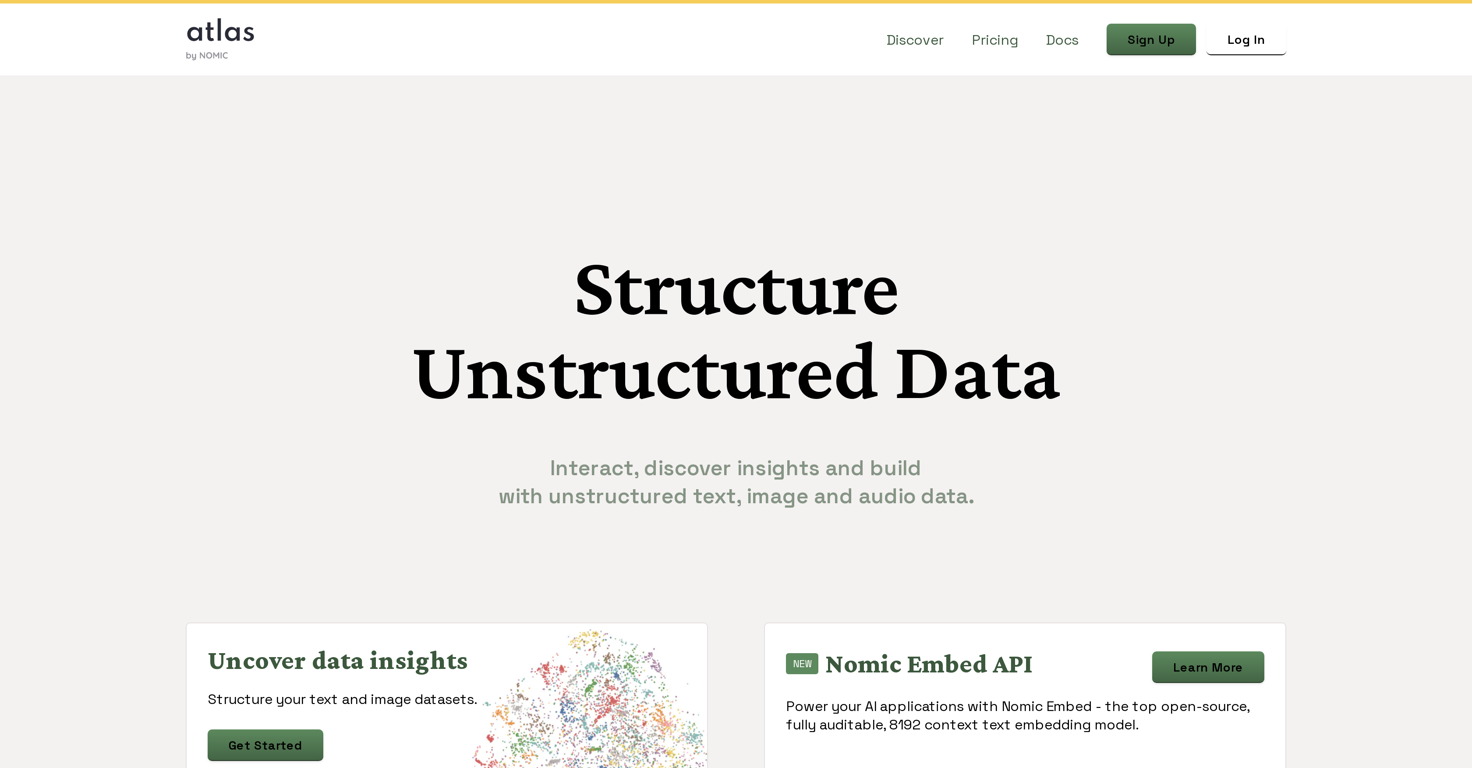What is Nomic Atlas?
Nomic Atlas is an artificial intelligence tool that specializes in structuring unstructured datasets. It assists in organizing, classifying, sorting, searching and analyzing data, contributing to the enhancement of strategic decision-making, improving operational efficiency, identifying trends and patterns, and providing valuable insights from complex, raw data sources.
What types of data does Nomic Atlas handle?
Nomic Atlas handles a variety of data types including text, images, embeddings, audio, and video.
How does Nomic Atlas help to structure unstructured data?
Nomic Atlas imposes structure on unstructured data by creating a predefined model or form, making it possible to manage and make sense of the data. It supports classification, sorting, searching, and analysis of the data, facilitating understanding and usage.
What are the fields that can benefit from using Nomic Atlas?
The fields that can benefit from using Nomic Atlas include artificial intelligence, machine learning, data analysis, and any area that deals heavily with large volumes of unstructured data.
Can Nomic Atlas aid in dealing with large volumes of data?
Yes, Nomic Atlas is extremely helpful in dealing with large volumes of data. It has capabilities to classify, sort, search and analyze such information efficiently.
What functionalities does Nomic Atlas provide for data searching?
Nomic Atlas provides functionalities to quickly search through the structured data, enhancing the ability to find specific data points within the organized dataset.
How can Nomic Atlas help in identifying data trends?
Nomic Atlas helps in identifying data trends by analyzing and understanding the structured data. This enables the discovery of patterns and insights that can contribute to strategic decision making.
Does Nomic Atlas contribute to strategic decision-making?
Yes, Nomic Atlas contributes to strategic decision-making by enabling organizations to understand and utilize data resources, identify trends and patterns, and derive valuable insights from them.
Can Nomic Atlas help in improving operational efficiency?
Yes, Nomic Atlas can help in improving operational efficiency by structuring unmanageable data into a manageable form, thus facilitating rapid search, sorting, and analysis of the data.
How can Nomic Atlas contribute to deriving insights from raw data?
Nomic Atlas contributes to deriving insights from raw data by structuring it, allowing for deeper analysis and understanding which can uncover valuable insights that were not easily discernible in the data’s unstructured state.
Does the performance of Nomic Atlas vary with the type of data?
Yes, the performance of Nomic Atlas may vary depending on the type of data and specific user requirements.
What types of media files can Nomic Atlas process?
Nomic Atlas can process an array of media files including text, images, embeddings, audio, and video.
What specific use-cases is Nomic Atlas best-suited for?
Nomic Atlas is best-suited for use-cases that involve dealing with large volumes of unstructured data in areas such as artificial intelligence, machine learning, data analysis, etc.
How does Nomic Atlas help organizations understand and utilize diverse data resources?
Nomic Atlas helps organizations understand and utilize diverse data resources by providing structure to unstructured data, allowing for efficient classification, searching, sorting and analysis of information, which ultimately enhances strategic decision-making.
Can I adjust the functionalities of Nomic Atlas to meet my specific needs?
Yes, the functionalities of Nomic Atlas can be adjusted based on the specific type of data and user requirements.
Does Nomic Atlas offer a predefined model or form for data?
No, Nomic Atlas does not offer a predefined model or form for data. Rather, it structures the data based on the analyzed information, providing tailor-made solutions.
Can Nomic Atlas assist with data analysis?
Yes, Nomic Atlas assists with data analysis by structuring unorganized data which can then be sorted, searched, and analyzed more efficiently.
How does Nomic Atlas sort data?
Nomic Atlas sorts data through its ability to structure and organize unstructured datasets. The exact methodology may vary based on the type of data and specific user requirements.
Does Nomic Atlas process both text and non-text data?
Yes, Nomic Atlas is able to process both text and non-text data including images, embeddings, audio, and video.




How would you rate Nomic Atlas?
Help other people by letting them know if this AI was useful.